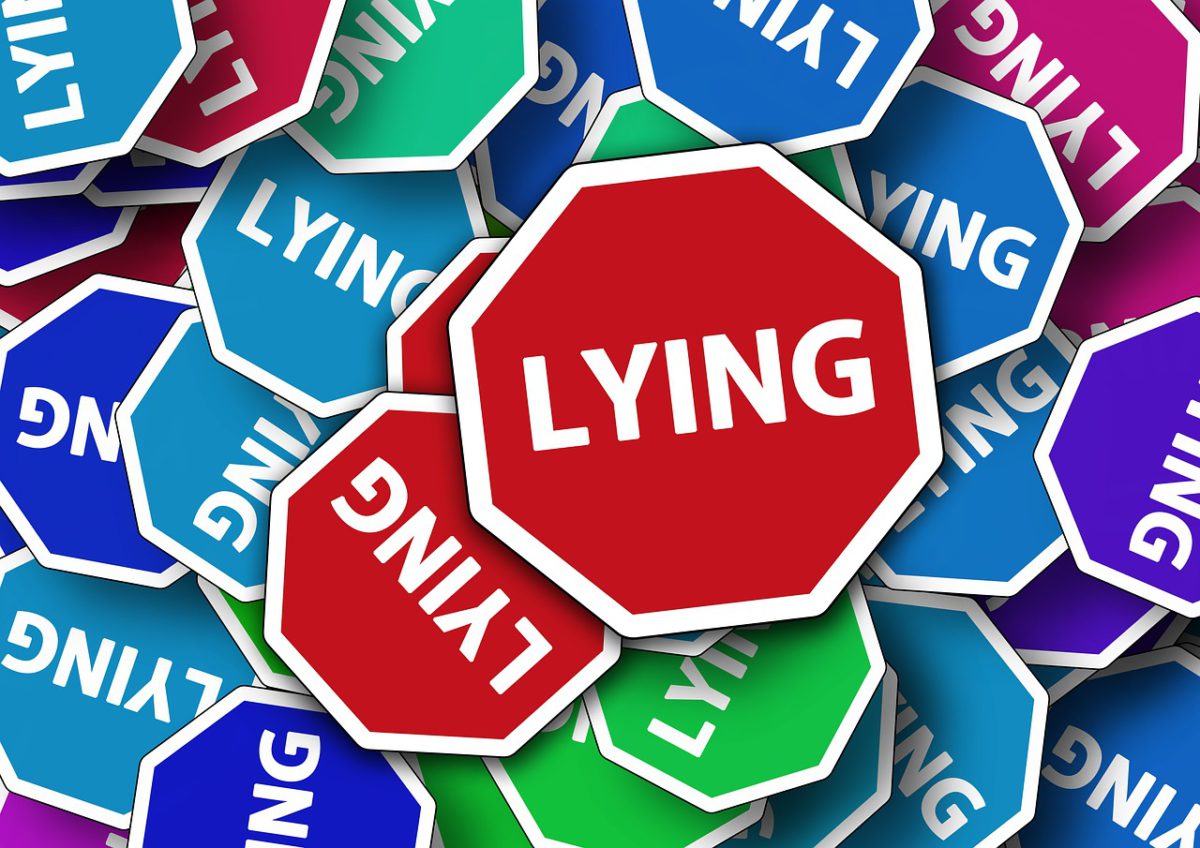
6 Lies Grads Tell Themselves While Job Hunting
- January 31, 2017
- Lucy Smith
I’ve spent the past few weeks chatting to many grads about their job hunting woes; most of whom who are tirelessly applying for jobs with little success. It surprised me to learn that some grads had actually made over one hundred different applications; some have not had one interview; some had attended multiple interviews but could not fathom why they never got any further; and many believed that they’re just unlucky.
With a little delving and probing, it turns out that many of the grads in question were fooling themselves. So I put my recruiting manger hat on, looked at their CVs and cover letters, chatted to them about their interview experience and their job-hunting strategies and some distinct patterns started to emerge – dare I call them lies?
Here’s what I found out, coupled with some tips to banish the half-truths…
- “My CV is pretty good. It’s not my CV stopping me from getting an interview.”
In addition to talking to the grads, we also ran a survey that asked this year’s cohort of grads what their biggest job hunting challenge is. Very few (15%) sited their CV as a problem.
This seems to be a recurrent theme, and I’m here to extinguish this lie that so many people tell themselves (hopefully once and for all):
If you have made lots of applications and not heard a peep from any of the recruiters – there is undoubtedly a problem with your CV.
The cold, hard truth is that if the top third of the first page doesn’t scream “RELEVANT SKILLS AND EXPERIENCE” or at least include something that the piques the recruiters interest then your CV will end up in then bin.
No feedback, no second glance, and, to be certain, the recruiter will have no guilt about this.
As far as the person who is looking at your application is concerned, if it doesn’t show them at least one or two things that they have specifically asked for in the job advert, then you have either done a bad job of selling yourself, or you don’t have the requisite skills and experience.
Now this might sound harsh, but it’s the truth. And the recruiter will not feel at all obliged to provide feedback to an applicant who hasn’t visibly tried to tailor their application.
So what can you do?
The very best (and quickest) way to improve your CV is to ensure that you include relevant experience at the very top of page 1 of your CV. To help you with this I devised an easy to follow system called ‘The Highlighter System’ that takes you step-by-step through this process.
- “I’ve tailored all my job applications to the job role.”
This one is not so much an out-and-out lie but an example of graduates kidding themselves. What we discovered is that many grads think they have tailored their job applications, because a skim-read of the job advert threw up many words that they included in their CV.
What is happening here, is that the grad is reading the job advert pretty quickly, thinking ‘yes I can do that’, ‘and I can do that’, ‘and I can do that’… ‘brilliant this is one to apply for’… ‘in fact it’s a sure fire winner’… ‘it’s all on my CV already’… ‘I’m so excited I’m going to upload it now’.
And click! The damage is done.
In haste and genuine excitement, the CV is uploaded without first ensuring that it does the best job of matching the candidates experience to what the job is asking for. (And, by the way, the grads do usually have the skills and experience, but they’ve just neglected to make it relevant for that company and that role).
This is an easy one to put right.
Start by making a note of the application deadline. Don’t be fooled that if you apply quickly your CV will be looked at first and therefore you have a better chance. You don’t. A recruiter will be excited when they see an application that closes matches the skills and experience that they listed on the job ad, not one that appears 5 minutes after they posted the ad.
- “It’s a numbers game. The more applications I make – the odds of getting an interview swing in my favour.”
They don’t. Not a jot.
If you’re reading this and a little part of you is thinking, ‘yeah, she has made some OK points so far, but one of the 100 applications I’ve made is sure to come in’, I suggest that you re-read numbers 1 and 2 above.
It’s all about RELEVANCE. So for the next application you make after reading this try following this 2 step process:
- Have you got the relevant skills and experience for the role? Yes? Great go to step 2 > No? Don’t apply!
- Have you put the relevant skills and experience that they have listed on the job advert explicitly on your CV? Take a highlighter pen and highlight them (remember the Highlighter System from point 1 – it really does work!)
- If you have a CV with a profile at the top as most people do nowadays. Make sure it describes at least 3 of the relevant skills and experience that you have, that are also listed on the job advert.
I’ll put my metaphorical money where my mouth is and bet you get an interview within 5 applications if you do this correctly.
- “I’ve got loads of relevant experience.”
Please remember that it’s only relevant if it’s listed on the job ad.
We uncovered many instances of grads being so sure they had relevant experience. When we dug a little deeper and looked at it in the cold light of day, their experience was often related to the industry or the company, but it wasn’t actually included in the skills listed on the job spec as “required skills”.
For recruiters some things are “nice-to-haves” – you may see these listed as “Additional Skills” and other things are “must-haves” – and you’ll often see these listed as “Required Skills”. It’s the required skills and experience that the recruiter uses to score your application and will determine whether you get an interview or not. The rest, for them, is just gravy!
Let’s give you an example.
One chap had a love of skiing, knew the industry inside out, had experience working in an outdoor sports shop, a degree in business management and was applying for a social media marketing role for an online outdoor sports retailer.
The online sports retailer was specifically looking for a graduate (tick), with some practical experience of managing social media channels (no tick), an appreciation of ecommerce (no tick). And some knowledge of the outdoor sports industry was a bonus (tick).
Even in this instance, the candidate’s passion, his industry knowledge and his degree wasn’t enough to get him an interview. He unfortunately failed to mention that he was a prolific Instagram and Twitter user and had once written a blog for a mate’s website.
That, albeit relatively small amount of, social media experience and savvy may well have been enough, if positioned correctly, to get him an interview for this position.
- “I performed exceptionally in the interview and I have no idea why they didn’t call me back…”
This is a very hard one to unpick. And I think this often comes down to the individual’s lack of experience in interview situations. The recruiting manager is going to be nice to you because they want to get the best out of you. They want you to do really well in an interview because it’s better for them if they have more candidates to choose from.
So it’s very common to leave an interview thinking you’ve done really well. And you probably have.
The thing to remember is that the recruiters are seeing lots of people. My tip is to openly talk about the interview process with the recruiter. Ask how many candidates they are seeing. You can also ask about how you have just performed.
Many grads are frustrated after the interview that they don’t get any feedback. It’s feels unfair, and often is. So at the end of the interview why not ask how you’ve done. You can frame it like this:
“I know it’s unlikely that you’ll have the time to give individual feedback after this process, but I just wondered if you could give me any tips on my interview style and how I have performed?”
This type of question has a number of benefits:
- The recruiter will ascertain (if they haven’t already) that you are enthusiastic, you welcome feedback and you are mature.
- You will get some good advice that you can take away and use next time if you are unsuccessful.
- You will probably be able to tell if you are likely to get invited back for a second interview.
The recruiter isn’t allowed to compare you to other candidates, and they wouldn’t tell you if you had been successful or not, there are rules around that. But they can give you feedback about your performance.
- I’m just unlucky!
This is never the case. Luck just doesn’t come into it.
One piece of advice that I learned from a wise senior manager of mine is to try to be aware of what I don’t know, or at least be aware that there is a lot that I don’t know and need to learn.
As a fresh faced graduate I was naïve – I thought the world owed me a living, and I thought my Media degree was a shoo-in into a Media job. And I was so wrong!
Many graduates I talk to, through no fault of their own (it’s normal), just don’t have a clue about a lot of what recruiters expect them to know about.
My advice? Spend some time thoroughly researching the industry you want to work in. Read accounts from people who work in the industry. Make sure it’s for you, before you start applying for roles. It may seem counterintuitive and that you just want to get on applying for roles, but being able to demonstrate knowledge on a subject is far stronger than saying you are passionate about it (when you don’t really know what IT is).
If you think you are simply unlucky, think again.
Jobs don’t appear on trees, it’s not a numbers game. I’ve almost run out of clichés… All that’s left to say is – the old adage – “it’s quality not quantity” is definitely the name of the game here. Good luck!
Inspiring Interns is a graduate recruitment agency which specialises in sourcing candidates for internships and giving out graduate careers advice. To hire graduates or browse graduate jobs, visit their website.






